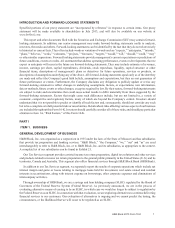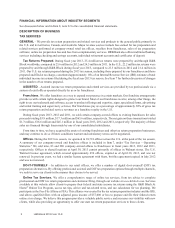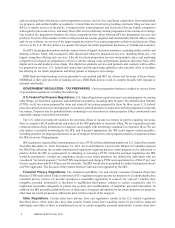HR Block 2013 Annual Report Download - page 17
Download and view the complete annual report
Please find page 17 of the 2013 HR Block annual report below. You can navigate through the pages in the report by either clicking on the pages listed below, or by using the keyword search tool below to find specific information within the annual report.10 H&R Block 2013 Form 10-K
U.S. federal and certain state taxing authorities, as well as taxing authorities in certain foreign jurisdictions in which
we operate, currently offer, or facilitate the offering of, tax return preparation and electronic filing options to taxpayers
at no charge, and volunteer organizations prepare tax returns at no charge for low-income taxpayers. In addition, many
of our competitors offer certain tax preparation and electronic filing options at no charge. In order to compete, we also
have free tax service offerings in several categories. We enabled the preparation of 774,000, 861,000 and 767,000 U.S.
federal income tax returns in fiscal years 2013, 2012 and 2011, respectively, at no charge through the FFA. We also
have free online tax preparation offerings and provided free preparation of Federal 1040EZ forms in fiscal years 2013,
2012 and 2011, and free RACs to certain clients in fiscal year 2012. There can be no assurance that we will be able to
attract clients or effectively ensure the migration of clients from our free tax service offerings to those for which we
receive fees, and clients who have formerly paid for our tax service offerings may elect to use free offerings instead.
These competitive factors may diminish our revenue and profitability, or harm our ability to acquire and retain clients.
Government tax authorities, volunteer organizations and our direct competitors may also elect to expand free offerings
in the future. From time to time U.S. federal and state governments have considered various proposals (often referred
to as “Return-Free Filing” or “Real-Time Tax”) through which the respective governmental taxing authorities would
use taxpayer information to “pre-populate,” prepare and calculate tax returns and distribute them to taxpayers. The
taxpayer could then challenge the return or sign and return it. Although the FFA has kept the federal government from
becoming a direct competitor to our tax service offerings in the U.S., it has fostered additional online competition and
may cause us to lose significant revenue opportunities. We anticipate that governmental encroachment at both the U.S.
federal and state levels, as well as comparable government levels in foreign jurisdictions in which we operate, may
present a continued competitive threat to our business for the foreseeable future.
See tax returns prepared statistics included in Item 7, under “Tax Services – Operating Statistics.”
Failure to comply with laws and regulations that protect our clients’ and employees’ personal and
financial information could harm our brand and reputation and could result in significant fines,
penalties and damages.
A number of our businesses collect, use and retain large amounts of personal client information and data, including
credit card numbers, tax return information, bank account numbers and social security numbers. In addition, we collect
and maintain personal information of our employees in the ordinary course of our business. Some of this personal
information is held and some transactions are executed by third parties. We use security and business controls to limit
access to and use of personal information. However, unauthorized individuals or third parties may be able to circumvent
these security and business measures, which may require notification under applicable data privacy regulations. We
employ contractors and temporary employees who may have access to the personal information of clients and employees
or who may execute transactions in the normal course of their duties. While we conduct background checks and limit
access to systems and data, it is possible that one or more of these controls could be circumvented. Improper disclosure
or use of our client's personal and financial information could result in damage to our brand and reputation; actions
required to remediate improper disclosures could be costly.
We are subject to laws, rules and regulations relating to the collection, use, disclosure and security of consumer
financial information, which have drawn increased attention from U.S. federal and state governments, as well as
governmental authorities in foreign jurisdictions in which we operate. In the U.S., the IRS imposes various prohibitions
on the use or disclosure by a tax return preparer of a taxpayer's information for purposes other than tax return preparation
without the prior written consent of the taxpayer. In addition, other regulations require financial service providers to
adopt and disclose consumer privacy policies and provide consumers with a reasonable opportunity to “opt-out” of
having nonpublic personal information disclosed to unaffiliated third parties. Several jurisdictions have passed new
laws in this area and other jurisdictions are considering imposing additional restrictions. These laws may be interpreted
and applied inconsistently from jurisdiction to jurisdiction and our current data protection policies and practices may
not be consistent with those interpretations and applications. In addition, changes in these U.S. federal and state
regulatory requirements, as well as requirements imposed by governmental authorities in foreign jurisdictions in which
we operate, could result in more stringent requirements and could result in a need to change business practices, including
the types of information we can use and the manner in which we can use such information. Establishing systems and
processes to achieve compliance with these new requirements may increase costs or limit our ability to pursue certain
business opportunities.
























